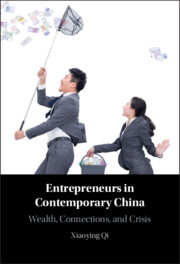Book contents
- Entrepreneurs in Contemporary China
- Entrepreneurs in Contemporary China
- Copyright page
- Dedication
- Contents
- Acknowledgements
- Introduction
- 1 E-Commerce
- 2 Making Social Networks
- 3 Trust, Broken Trust, and Trust Renegotiated
- 4 Family Business and Its Management
- 5 Female Entrepreneurs
- 6 Crisis as Opportunities
- Conclusion
- Appendix
- References
- Index
Conclusion
Rethinking Entrepreneurship: Trust, Networks, Crisis, and Gender
Published online by Cambridge University Press: 24 August 2023
- Entrepreneurs in Contemporary China
- Entrepreneurs in Contemporary China
- Copyright page
- Dedication
- Contents
- Acknowledgements
- Introduction
- 1 E-Commerce
- 2 Making Social Networks
- 3 Trust, Broken Trust, and Trust Renegotiated
- 4 Family Business and Its Management
- 5 Female Entrepreneurs
- 6 Crisis as Opportunities
- Conclusion
- Appendix
- References
- Index
Summary
The Conclusion highlights how an examination of entrepreneurs in contemporary China, including a careful and empirically grounded account of business and social relations in China, challenges many conventional approaches to research and research findings regarding such core concepts as trust, social networks, crisis, gender, family business, and e-commerce, and shows how standard conventions that are widely accepted in the scholarly and research literatures are in need of revision. It is shown how this book provides a clarification and extension of the conceptualization of a number of core theoretical notions by drawing on the details of the many cases that are explored in the six chapters of this monograph. It is shown how the research findings reported in this book will serve the purpose of stimulating and encouraging further research on erstwhile neglected aspects of business relations as well as the development of new theoretical frameworks for understanding social exchange dynamics in business, not only in China but more generally.
- Type
- Chapter
- Information
- Entrepreneurs in Contemporary ChinaWealth, Connections, and Crisis, pp. 143 - 154Publisher: Cambridge University PressPrint publication year: 2023



